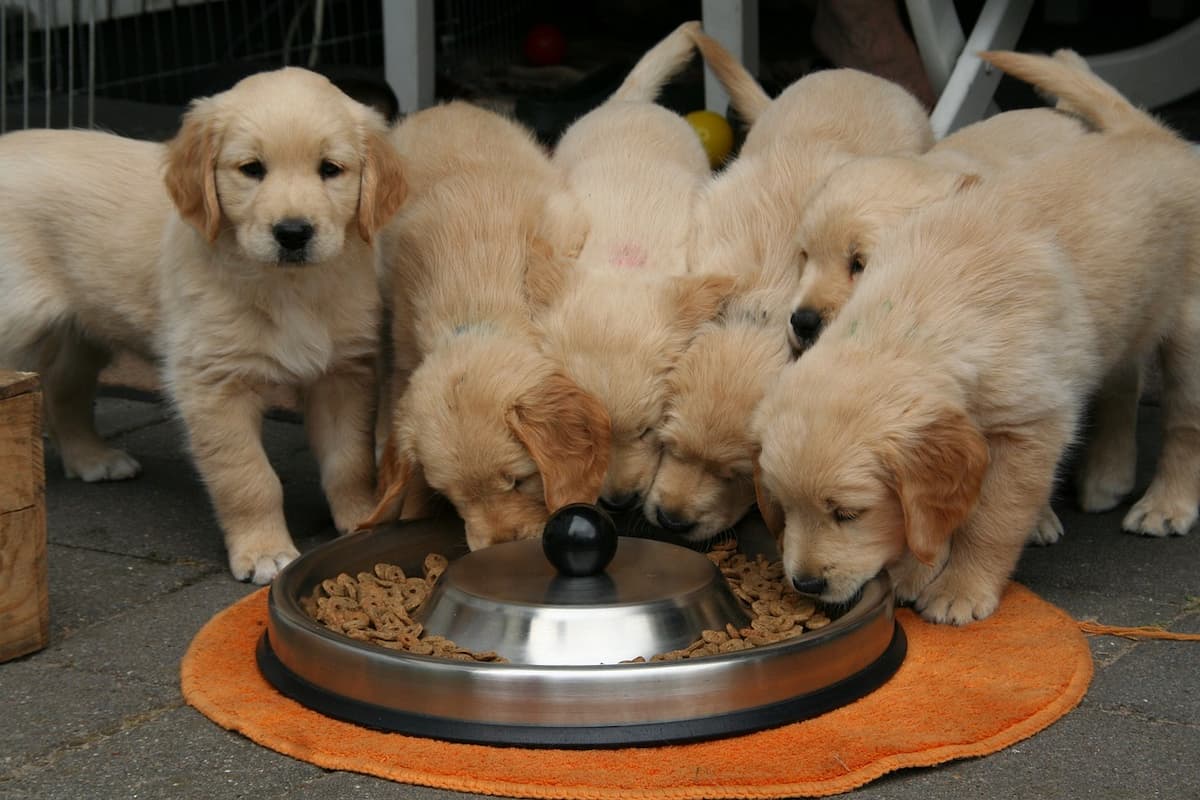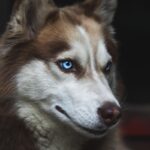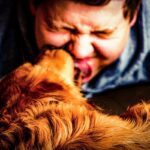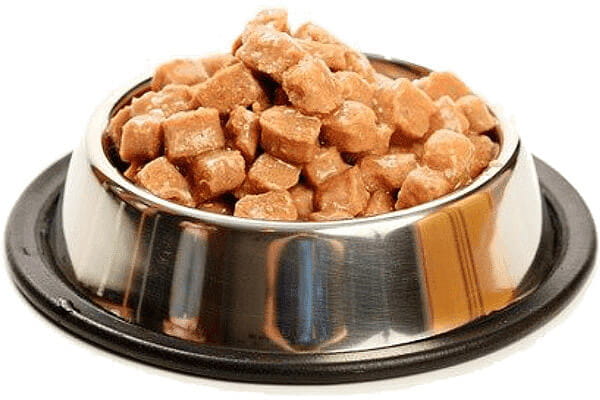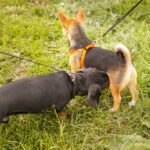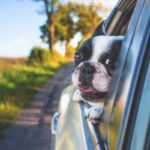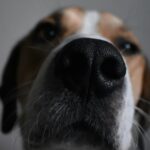Picture yourself lounging lazily on the couch, enjoying a peaceful evening, when suddenly, you witness something utterly revolting.
Your beloved furry companion, who has brought warmth and laughter into your life, casually sniffs around their own waste and—hold your breath—unleashes their inner gastronome, devouring it like it’s a five-star delicacy.
And just when you think you’ve seen it all, you catch them mid-act, glugging down a surprise beverage—none other than their very own urine.
Why on Earth do dogs eat their poop and drink their pee?
This article has all the gross answers.
Decoding the Instinctual and Learned Factors Behind Dogs’ Coprophagia and Urophagia
Dogs are fascinating creatures full of surprises, but one peculiar behavior that many dog owners find puzzling is their tendency to eat their own poop and drink their pee.
It’s a sight that leaves us scratching our heads, wondering, “Why on earth would they do that?”
First and foremost, it’s important to understand that not all dogs engage in this unsavory habit.
In fact, studies suggest that up to 16% of dogs have been seen snacking on their feces at least once.
So why do some dogs feel the need to feast on their own waste?
Here are intriguing reasons behind this seemingly bizarre (and disgusting) behavior:
1. Instincts at play: While it may be difficult for us to fathom, dogs have inherited certain instincts from their wild ancestors.
In the wild, eating their waste helped keep their surroundings clean and minimize the risk of attracting predators.
These instinctual behaviors can still be deeply ingrained in some dogs, leading them to act in a way that seems counterintuitive to us.
2. Nutritional deficiency: Believe it or not, another reason behind this behavior could be a lack of nutrients in a dog’s diet.
Dogs have a remarkable ability to detect nutritional deficiencies through smell, and they may try to rectify this by consuming their own waste.
This compulsive behavior might be their way of seeking out nutrients that they feel they are lacking.
3. Stress and anxiety: Dogs, like humans, can experience stress and anxiety, and this can manifest in various ways.
In some cases, dogs may resort to eating their poop or drinking their urine as a coping mechanism.
This behavior provides a temporary sense of comfort or distraction from their anxiety.
It’s important to note that this is not a conscious decision but rather a response to their heightened emotions.
4. Learned behaviors: Dogs are also influenced by learned factors in their environment.
Puppies, for example, observe their mother cleaning them and ingesting their waste as a way to keep the den clean and prevent attracting predators.
This maternal behavior can imprint on puppies, leading to them mimicking it later in life.
Additionally, dogs that have been kept in confined spaces or deprived of regular access to food and water may resort to coprophagia and urophagia as a means of alleviating their hunger and thirst.
5. Scent: Dogs have a highly developed sense of smell, so it may be that your dog is simply attracted to the smell of poop or urine, particularly if it contains high levels of protein.
Examining Health Risks of Dogs Consuming Their Waste
While it is certainly a gross habit to witness, the act of dogs consuming their waste does come with potential health risks. Here are a few dangers associated with this behavior that every dog owner should be aware of:
1. Intestinal parasites: Dogs who eat their poop are at a greater risk of ingesting intestinal parasites such as roundworms or hookworms.
These parasites can cause various health issues, including diarrhea, weight loss, and even anemia.
2. Spread of bacteria and viral infections: Dogs’ waste is full of bacteria and viruses that can be harmful to their health.
By consuming their waste, dogs are exposing themselves to potential infections and gastrointestinal upsets.
3. Nutritional deficiencies: Contrary to popular belief, eating poop does not provide dogs with the essential nutrients they need.
In fact, it may interfere with their regular diet and lead to imbalances in their nutritional intake.
Understanding the underlying factors behind coprophagia and urophagia can help us approach these behaviors with patience and empathy.
As responsible dog owners, it is crucial to discourage this behavior and ensure that our furry friends have a balanced and healthy diet.
Prevent and Manage Coprophagia and Urophagia in Dogs with Tips and Tricks
So, how can you prevent and manage coprophagia and urophagia in your dog?
Here are some tips and tricks:
Ensure a balanced diet: Make sure your dog’s diet is nutritionally complete and provides all the necessary vitamins, minerals, and nutrients.
Consult with your veterinarian to determine if any dietary changes are needed.
Keep the environment clean: Regularly clean up after your dog to remove any opportunities for them to engage in these behaviors.
Promptly dispose of feces and clean up urine accidents in a timely manner.
Provide mental and physical stimulation: Engage your dog in regular exercise and play sessions to prevent boredom and reduce stress.
Mental stimulation activities, such as puzzle toys and training sessions, can also be beneficial.
By implementing these tips and tricks, you can help prevent and manage coprophagia and urophagia in your dog.
Remember, consistency and patience are key when working to modify your dog’s behavior.
If the habits persist or worsen, it is recommended to consult with a professional trainer or veterinarian for further guidance and support.
After all, your dog’s health and happiness are what truly matter.
FAQ
Q: Why do dogs engage in such peculiar behaviors?
A: Well, there can be several reasons behind this curious habit.
Firstly, some dogs may eat their poop due to instinctual behaviors inherited from their wild ancestors.
In the past, when resources were scarce, dogs would consume their waste to prevent attracting predators or other scavengers.
Q: Wait, but why would they drink their pee?
A: Good question!
While not all dogs drink their own pee, some might engage in this behavior as a response to specific stimulants present in their urine.
These stimulants might give off an enticing smell or taste for dogs, causing them to experiment with this quirky behavior.
Q: Is eating poop or drinking pee harmful to dogs?
A: Generally speaking, these habits are not particularly healthy.
In fact, dogs who indulge in such habits could expose themselves to potential health risks.
Consuming feces, for example, can introduce parasites or harmful bacteria into their bodies.
Similarly, drinking urine might cause infections or complications if certain toxins are present in the urine.
Q: Is there anything we, as responsible pet owners, can do to prevent coprophagia and urophagia?
A: Absolutely!
The key lies in understanding the root causes behind these habits.
If your furry friend is eating their poop or drinking their pee due to dietary deficiencies, for instance, adjusting their diet might be helpful.
Ensuring your dog receives balanced meals, complete with all necessary nutrients, can make their poop less attractive.
Additionally, training your dog to respond to commands like “leave it” or ”drop it” can discourage them from engaging in such behaviors.
Q: Are there any underlying medical conditions that may cause dogs eat their poop and drink their pee?
A: It’s possible.
Sometimes, dogs may consume their feces or urine due to medical issues like malabsorption disorders, enzyme deficiencies, or underlying illnesses.
It’s always a good idea to consult with a veterinarian if you notice your furry friend exhibiting these habits excessively or if the behavior suddenly starts to occur.
Q: So, to wrap it up, eating poop and drinking pee is a curious but relatively common behavior in dogs?
A: Exactly!
While eating poop and drinking pee may seem repulsive and strange to us, it’s important to approach this topic with understanding.
Remember, dogs are complex creatures with a multitude of instincts and behaviors.
By addressing any underlying medical issues, providing a balanced diet, and implementing positive training techniques, we can help our furry pals overcome these quirky tendencies.
Closing the Chapter
While it may seem downright bizarre to us, our furry friends seem to have their reasons for engaging in such unusual behavior.
It might be rooted in their natural canine instincts, as dogs in the wild would often consume their waste to eliminate any trace of their presence or potential diseases.
It could also be a result of boredom, stress, or nutritional deficiencies.
But don’t fret!
It’s not all doom and gloom.
There are ways to discourage these less-than-appetizing habits.
We’ve learned that providing our furry companions with a well-balanced diet, ensuring they get plenty of exercise and mental stimulation, and keeping a close eye on their potty routines can make a significant difference.
So next time you catch your precious pooch engaged in such unseemly activities, remember that it’s not a reflection of their love for grossness, but rather a reflection of their instinctual behavior or some other underlying issue.
Remember to consult with a veterinarian if you’re concerned about your four-legged friend’s health.


